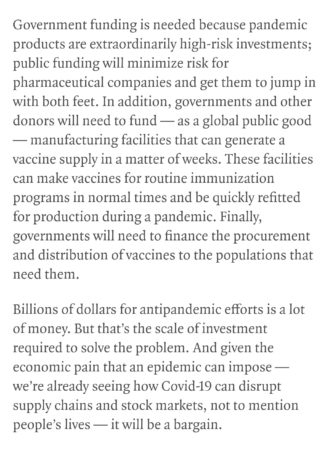Here are some things I think I am thinking about:
1) Is it different this time?
I wrote in my book that it’s always different this time. No two economic environments will ever be the same, but we can learn a bit from history and better prepare ourselves for what might be coming.
I wrote a short Twitter thread about my general thoughts on the Coronavirus. No one really knows what to expect. So be careful putting too much faith in anyone’s forecasts and narratives. The one thing we know for certain is that many people will shoot first and ask questions later. So don’t overreact. The media and the permabears will, of course, blow this out of proportion because they make a living by keeping your attention by preying on your biases. Maybe the best thing we can do at times like these is turn off the TV and control what you can control (shaking people’s hands, touching your face, washing your hands, etc).
My general view here is that history provides a bit of guidance on what the risks are. On that front, I thought Max Roser provided a nice overview of the historical cases of influenza and coronaviruses and how they relate to the current environment. The Spanish Flu is particularly interesting here in the way that it was disseminated over the course of a year. It started in the Spring of 1918, then subsided in the summer and roared back to life in the Fall of 1918 and Spring of 1919. And that’s the big risk here that I think people need to be aware of. THIS THING COULD PERSIST.
This is going to make the financial markets very difficult to navigate over the coming year. The sheer uncertainty of the outcomes will lead many people to overreact. And if the expectations turn into real economic downturn then things could get very interesting later this year….
2) Monetary Policy will not be effective against this.
One of the main themes of this website coming out of the financial crisis was that Monetary Policy was not going to be very effective against the downturn. That’s not to say that the Fed shouldn’t have done anything, but my research basically boiled down to a simple point – QE wasn’t as effective as some expected it to be and so we needed to implement other policies in addition to this. I think the current environment is the same. Cutting rates and boosting the Fed’s balance sheet is not going to be achieve much.
On this front, I thought Bill Gates wrote a sensible piece about the importance of government funding to combat the potential outbreak. Here’s the important point:

This is such a low risk/high potential reward type of response. No brainer in my opinion. I’m surprised Congress isn’t acting yesterday.
3) Remember your first principles.
All of my work on the financial markets and economy is about formulating a first principles approach to everything. It’s about trying to think of the economy and the financial markets much like an engineer might think about how to build a plane. You first understand the basic principles of flight and then apply your engineering expertise in such a way that you optimize flight. The financial markets aren’t that different. I still think that too many people treat the financial markets as something they aren’t – a place where they might get rich or a place where they can make fast money.
During periods of great uncertainty it’s nice to get grounded. Remember those first principles so you can better understand the markets for what they are and not what our biases want to believe they are. So here are some of the most important points on that front:
- The stock market isn’t where you get rich. So try to think of your portfolio more like a savings portfolio and less like an investment portfolio.
- Most people can’t beat the market and no one beats the market in aggregate. So don’t get caught up in the beat the market game.
- The stock and bond markets are inherently long-term instruments. Stop thinking of them across short-term time horizons.
- Study the numerous links here to better understand these principles and more.
Be safe out there. Don’t be afraid to drink some actual Corona.
Mr. Roche is the Founder and Chief Investment Officer of Discipline Funds.Discipline Funds is a low fee financial advisory firm with a focus on helping people be more disciplined with their finances.
He is also the author of Pragmatic Capitalism: What Every Investor Needs to Understand About Money and Finance, Understanding the Modern Monetary System and Understanding Modern Portfolio Construction.

